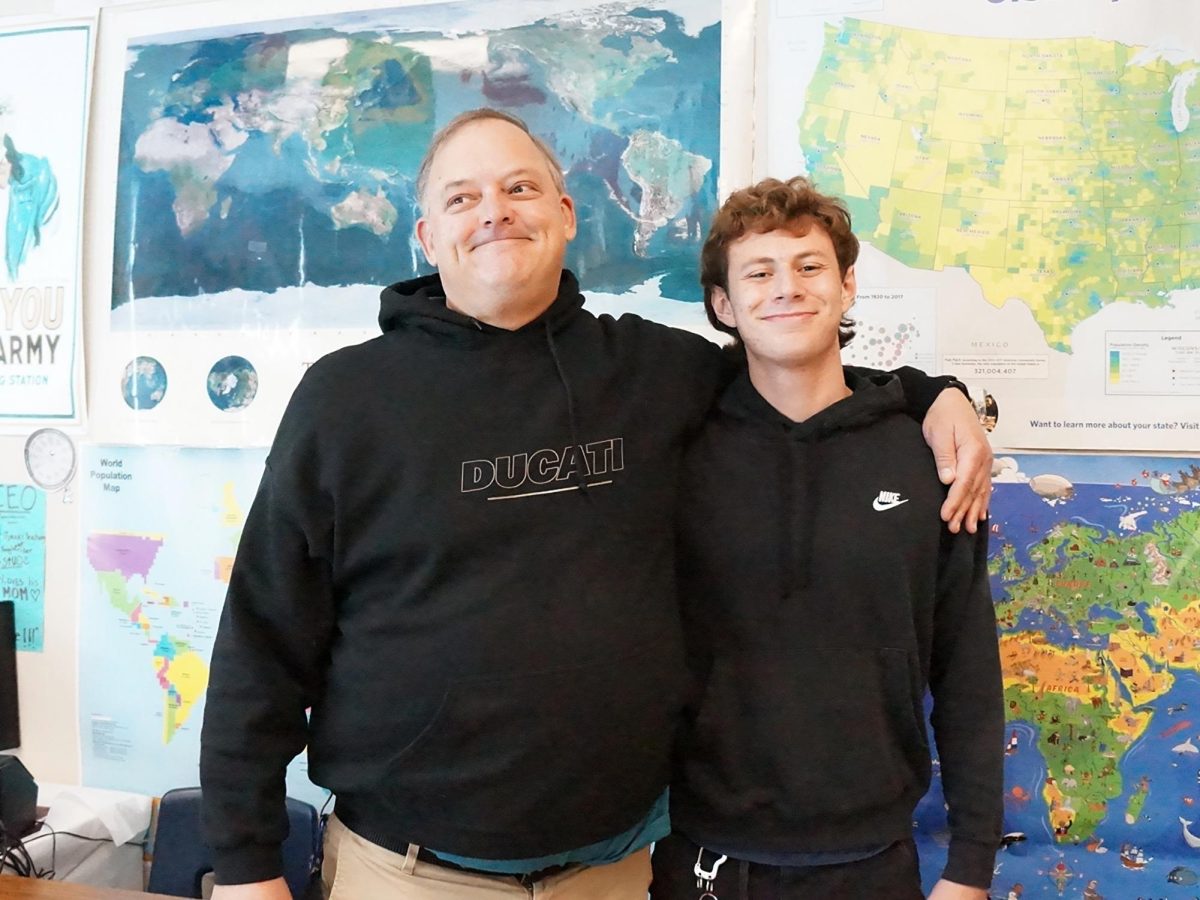During a football game, junior Nico Oliveira found himself exchanging fun stories with his favorite teacher, Daniel Skapinsky. Instead of learning about history, Oliveira gained useful life advice.
As the school year progresses and stress piles up from academics or personal lives, some students can begin to struggle with mental health. Teachers can be an accessible resource to turn to for help. With students and staff interacting throughout the school day, many students have seen benefits from creating positive relations with their teachers.
“You have someone you can actually talk to about things that maybe you wouldn’t want to say to students,” Oliveira said. “You can hear life experiences, and it’s good to just have an adult friend on campus.”
Much of the SCHS staff, including math teacher Anthony Brasil, try to create an environment where students can both learn and feel safe. Brasil explained the importance of building relationships with students and acknowledged its benefit on communication between teachers and students.
“I think you have to build a relationship so that the students feel comfortable, whether it be asking for help or if they’re having a bad day, they can let you know because not everybody’s gonna come in with 100% every day,” Brasil said.
Physical education teacher Michelle Bumbaca also believes it is important to build connections with students. She believes these relationships can benefit both the student and teacher when trust is established.
“When you show that you care, I feel like it works both ways – the student feels cared for and then I feel like I’m giving them something as well,” Bumbaca said.
According to senior Aryanna Morte, creating friendships with teachers can further students’ learning in that particular subject. She discussed how her friendship with math teacher Marlene Spector helps her in and out the classroom.
“Students are able to ask more questions more freely and are able to ask for help when they need it,” Morte said. “With Ms. Spector, I feel like I’m able to come to her about anything, whether I’m having trouble with certain schoolwork, or I need help managing my time, or I need to set my priorities straight.”
Similar to Morte, Oliveira believes creating a relationship with Skapinsky has impacted him in several ways. He had initially known Skapinsky through his older cousin, who had been Skapinsky’s prior student. Previously knowing Skapinsky made it easier for Oliveira to get comfortable in the classroom.
“It can make whatever you’re learning more personal instead of just academic because when you have a teacher who you can relate to and will make you actually care about something. It makes it so you learn better,” Oliveira said.
Likewise, Morte feels she can open up to Spector and have personal conversations, considering she has known Spector since freshman year. Having lunch in Spector’s classroom since sophomore year also allowed Morte and her friends to speak freely to Spector.
“I’ll have personal little checkups with her and I’ll talk to her about my life, and she’ll talk to me about her life,” Morte said. “It feels very genuine, and as a senior, it’s going to be really sad leaving and not being able to sit there at lunch anymore.”
When Brasil notices students struggling in class, he reaches out to ensure they get the needed support. He described a motivating talk given to a student to work harder, specifically on their homework, resulting in the student getting their grade up from a D to an A-.
“Sometimes I can see math isn’t easy for a lot of people, but I can sometimes tell when somebody is capable of more and they’re just not putting in the effort,” Brasil said. “A student I had to have a talk with, and I was like, ‘You can do better. I promise if you do your homework, your grade will go up.’”
For 20 years, Bumbaca had previously taught at another high school, and she had seen her former students reach adulthood. She is proud of her encounters since she believes her relationship with these students partly contributed to the person they are today.
“I’ve seen kids now that are not kids anymore. 20 years have passed and they’re grown adults, and seeing them in the community and having great jobs and having their own families, and just seeing them being successful,” Bumbaca said. “To me, I feel like I made those connections and was able to help those kids along the way.”
Positive student-teacher relationships have been shown to contribute to a supportive learning environment at SCHS, where students do not just learn the curriculum but also lessons applying to their outside lives. Several students believe their teachers have made an impact on their lives.
“I think she (Spector) taught me to be more organized with my planning, and just things in general that have helped me throughout the way,” Morte said. “I think without Ms. Spector, I wouldn’t become the student I am today.”


